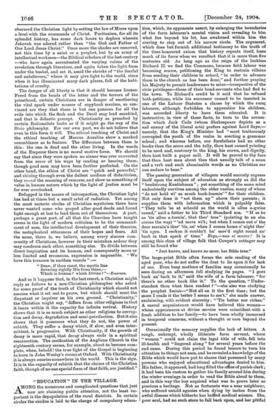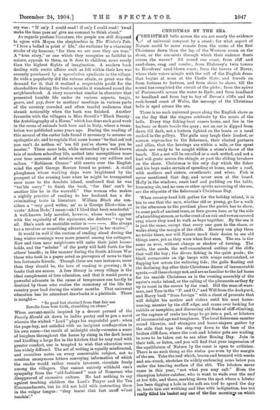A MONG the numerous and complicated questions that just now are
claiming public attention, not the least im- portant is the depopulation of the rural districts. In certain circles the exodus is laid to the charge of compulsory edues.-
tion, which, its opponents assert, by enlarging the boundaries of the farm labourer's mental vision and revealing to him what lies beyond his lot, has awakened within him the craving to step out of his narrow circle. The argument, which does but furnish additional testimony to the truth of the time-honoured axiom that history repeats itself, loses much of its force when we recollect that it is more than five centuries old. As long ago as the reign of the luckless Richard IL we find the Commons, because field labour was becoming scarce, petitioning the King to restrain villeins from sending their children to school, " in order to advance them in the church as has been done," and further praying his Majesty to permit landowners to seize—irrespective of the civic privileges—those of their bond-servants who had fled to the town. To Richard's credit be it said that he refused both petitions, while his successor caused to be inserted in one of the Labour Statutes a clause by which the rural labourer, although forbidden to apprentice his children, was accorded liberty to have them educated. It is instructive, in view of these facts, to turn to the accusa- tion which Jack Cade (whom Shakespeare depicts as a sad enemy of the liberal arts) prefers against Lord Saye,— namely, that the King's Minister had " most traitorously corrupted the youth of the realm in erecting a grammar school ; and whereas before, our forefathers had no other books than the score and the tally, thou hast caused printing to be used and, contrary to the king, his crown, and dignity, thou hast built a paper mill. It will be proved to thy face that thou hast men about thee that usually talk of a noun and a verb and such abominable words as no Christian ear can endure to hear."
The passing generation of villagers would scarcely express itself upon the subject of education as strongly as did the " headstrong Kentishman" ; yet something of the same mind undoubtedly survives among the older rustics, many of whom " do not hold wi' sa much book-learnin' " for their children. Not only does it " sat them up " above their parents ; it supplies them with information which is palpably false. " They tells 'ee at schoold as the world is allus a-gwine round," said a father to his Third Standard son. "If sa be as 'tis allus a-turnin', that ther' tree" (pointing to an elm across the way) " 'ud move wi't ; but when I comes out o' the door marnin's ther"tis, an' when I comes home o' night ther' 'tis agen. I reckon it couldn't ha' mov'd right round an' back in that speek o' time." Ergo,—non si muove ! It is among this class of village folk that Cowper's cottager may still be found who
" Just knows, and knows no more, her Bible true."
The large-print Bible often forms the sole reading of the aged poor, who do not suffer the dust to lie upon it for lack of use. Even busy mothers of families may occasionally be seen during an afternoon lull studying its pages. "I goes back an' back to it," said the wife of a farm labourer, " for there's no other book like it." To the question, " Undetr- standest thou what thou readest ? "—she also was studying the prophet Isaiah—" Not all on it the first time ; but the more I reads it the better I seems to see't," she made answer, exclaiming, with evident sincerity : " 'Tis better nor riches." A. casual acquaintance would have believed this woman— whose appearances at divine service were coincident with a fresh addition to her family—to have been wholly immersed in temporal concerns, without a thought or care beyond the present.
Occasionally the memory supplies the lack of letters. A rough, unkempt, wholly illiterate farm servant, whose " woman " could not claim the legal title of wife, fell into ill-health and " lingered along " for several years before the end came. During this period he found leisure to turn his attention to things not seen, and he revealed a knowledge of the Bible which would have put to shame that possessed by many persons who enjoyed educational advantages denied to him. His father, it appeared, had long filled the office of parish clerk ; it had been his custom to gather his family around him during the winter evenings in order to read the Bible aloud to them, and in this way the boy acquired what was to prove later so precious a heritage. Not as fortunate was a near neighbour, who suffered untold agonies when dying by inches from the awful disease which hitherto has baffled medical science. She, poor soul, had no such store to fall back upon, and her pitiful cry was " If on'y I could read ! if on'y I could read ! 'twud make the time pass an' give me summat to think about."
As regards profane literature, the people are still disposed to agree with Mopes the shepherdess in The Winter's Tale.
"I love a ballad in print o' life," she exclaims by a charming stroke of sly humour, "for then we are sure they are true." A "true story," or one which they recognise as faithful to nature, appeals to them, as it does to children, more surely than the highest flights of imagination. A modern book dealing with rustic affairs such as fell within their ken was recently purchased by a speculative syndicate in the village. So wide a popularity did the volume attain, so great was the demand for it, that it realised a respectable profit for the shareholders during the twelve months it wandered round the neighbourhood. A story somewhat similar in character that presented humble life under its various aspects, tragic, grave, and gay, drew to mothers' meetings in various parts of the country crowded and often tearful audiences that shrank noticeably when the book was finished. Another favourite with the villagers is Miss Sewell's " Black Beauty : the Autobiography of a Horse," which has done such good work in the cause of animals both here and in Italy, where a trans- lation was published some years ago. During the reading of this several of the carter lads found it necessary to assume an apologetic air, and to explain that some horses " be that ock'erd you can't do nothen wi"tun till you've shown 'um you be master." These same lads, while untouched by a well-known tale of modern schoolboy life, melted into surreptitious tears over true accounts of mission work among our soldiers and sailors. " Robinson Crusoe " still exerts over the English mind the spell George Borrow found so potent. A stolid ploughman whose working days were brightened by the prospect of the evening hour when he might be transported once more to the desolate island, confessed that he was " teible sorry " to finish the hook, " fur they can't be another like he in the wurruld." One woman who makes a nightly practice of reading to her husband has a dis- criminating taste in literature. William Black she con- siders a " very good writer, an' so is George Eliot—him as wrote Adam Bede,' I mean—ah ! I liked that book wonderful" A well-known lady novelist, however, whose works appear with the regularity of the equinoxes, she declares " tops 'em all. She's such an excitable writer is — She always has a revolver or something adventures [sic] in her stories."
It would be well if the custom of reading aloud during the long winter evenings were more general among the cottagers. Now and then near neighbours will unite their joint house- holds, and the " scholar " of the party will hold forth for the others' benefit ; in like manner during the South African War those who took in a paper acted as purveyors of news to timir less fortunate friends. Though these are rare instances, rarer than they should be, the love of reading is growing ; it is books that are scarce. A free library in every village is the ideal complement of free education, and that it would prove a powerful advocate in the cause of temperance can hardly be doubted by those who realise the monotony of the life the country poor lead during the winter months. That universal education has its attendant drawbacks is a platitude. There is naught- " So good but strained from that fair use Revolts from true birth, stumbling on abuse."
When servant-maids inspired by a devout perusal of the Family Herald sit down to indite poetry and to pen a novel wherein the wicked " Lord " plays his ungrateful part : when the page-boy, not satisfied with an incipient conflagration in his own room—the result of midnight study—creates a scare of burglars throughout the house by rising in the dark hours and kindling a large fire in the kitchen that he may read with greater comfort, one is tempted to wish that education were less widely diffused. The art of writing is equally misdirected, and countless notes on every conceivable subject, not to mention anonymous letters conveying information of which the reader would rather remain ignorant, circulate freely among the villagers. One cannot entirely withhold one's
sympathy from the " old-fashioned " man of Somerset who disapproved of excessive culture. He had nothing to say against teaching children the Lord's Prayer and the Ten Commandments, but he did not hold with instructing them in the vulgar tongue : " they learnt that fast snuff wi'out teachin'."



































 Previous page
Previous page